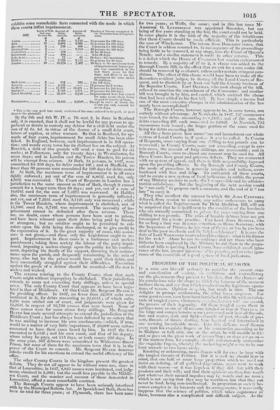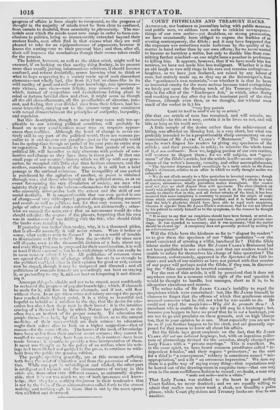PROGRESS OF THE POLITICAL SEASONS.
Jr a man sets hinir:elf seriously to consider the present state and constitution of society, so -multiform and contradictory are the pinenomena they present to his view, that the chances are his conclusions take the shape to %Odell the liamour of the moment inclines them, and not that which results front the legitimate opera- tions of reason. Opinion is q' ;irk, but truth is slow. The one I delights in prompt settlements, the other lovk s suspense. For some good reason, men have been fiirnished in this life with an inlini- tude of tangled yarns, whereon to cX..•:*Cit,e, but not witl one accord, the powers of their ingenuity. Of these tangled yarns there is perhaps none so out of all measure tangled as that of Pont-11os, in the large and coin priliensive sill se ; ci onposed as it is of all threads, line and coarse, dark and light—threads. of past, threads of pre- sent, threads of cut tire destiny, here knotted and intertwined in one seeming inextricable maze. Into this delicate wcof thrusts every man his exquisite fingers or his mutton-6st according; as he be (Edipus or fool, (for, one or the other, he will meddle in it): and so goes on the great work oh' unravelling ; or does not go on— if the mutton lists, for example, should unforttmately out the exquisite fngers, whereby the reckoning might come to be one knot unmade to two knots made.
Knotting or mil:miffing, nien's ringers mill air ever be busy with the tangled threads of Politics. But it is well we should bear in mind, that one half, or some large proportion which we need not insist on defining, of all political dogmatists, never went to work with their reason—or it was hopeless if they did- -but with their passions and their will ; and that their opinions are thercfbre worth just whatever their natural impulses may be worth, and no more; which is not saying that they may be worthless, but that they can never be final, being non-intellectual. In proportion as society be- comes complex in its interests and its arrangements, it necessarily happens that the science of politics, which takes cognizance of these, becomes also a complicated and difficult subject. As the progress of affairs is from simple to compound, so the progress of thought in the majority of minds must be from clear to confused, from certain to doubtful, from unanimity to pluranimity. The ma- terials over which the Minds must now range in order to form con- clusions in politics, being so immeasurably extended beyond their ancient limits, men often find in that' excess what they are well pleased to take for an equiponderance of arguments,- because it leaves the casting-vote to their personal bias ; and thus, after all, their will imposes the conclusions though their reason takes credit for the process.
The boldest, however, as well as the ablest mind, might well be excused, if on looking on that motley thing Society, in its present more than usually jarring, inharmonious relations, it should become confused, and retreat doubtfully, scarce knowing what to think or what to hope respecting it ; a society made up of such discordant elements—not wholly bad, (far from it,) but so chaos-like in its wild medley of good and evil—of rare knowledge, rare ignorance— rare virtues, rare vices—rare felicity, rare misery—a society in which, instead of sympathies and assimilations taking place in mind or fortune betwixt class and class, it might seem as though all the old class-allotments, all the peculiarities of situation, inte- rest, and feeling, that ever divided men from their fellows, had be- come intensified, Carrying out to the utmost verge not consistent with actual dismemberment the principles of antipathy, inequality, and repulsion.
But this description, though to sonic it may seem only too ap- - plicable to our existing political condition, will probably be found on nearer consideration more true as respects appear- ances than realities. Although the hand of change is never en- tirely still in any part of the political world, there are seasons pc- .culiar to it and seasons not peculiar—just as the vegetable world has its spring-time though no period or its year puts an entire stop to vegetation. It is reasonable to believe that periods of rest, in political life, will hereafter as duly alternate with periods of con- tention aud change as they ha\ c done in times past. If that one small page of our country's history which we fill up with our gene- ration, be occupied with little else than factious clamours, and the restless, ceaseless demands of the masses, it is still but a brief passage in the national existence. The tranquillity of one period is purchased by the agitation of another, as peace is obtained through war ; and those who bewail at the political storm, as at an ,eVent forerunning the very dissolution of society, are men who mistake their page for the volume—themselves for the world—and who miserably misconceive bath the extent and the drift of our social destinies. It is uni-gteStionable that our own period is one of change—of very wide-spread, general change, affecting manners and morals as well as polities; but, for that very reason, we must judge of other times and states relatively, not abstractedly ; other- wise we commit the same error that an astronomer would do who should calculate the courses of the planets, forgetting that his own was in motion—or of one drifting with the tide, who should think the banks were running by. If Testerday was better than to-day, why, it is a thousand pities, that is all—for assuredly it will never return. Were it better or worse, what matters even to discuss? It saves a world of trouble to discriminate well the evitabb, from the inevitable ; for since men will dispute, even to the thousandth division of a hair, about any and every thing that can be proposed for their consideration, it is well ot least iftheir contenftel has to do with things which can really be in some manner affected by it. All politicians of common sense are agreed that the tide of .change which has set in so strongly in the political world, whether in their opinion for good or evil, cannot now be stayed, though it may he tempered and directed ; and all Politicians of common honesty are accordingly not bent on staying it, or pretending to stay it, and ore bent on tempering it and direct- ing it.
Amongst things invitable and not to be stayed, must confidently be reckoned the progress of popular knowledge ; which, if channels be made for it, will flow in those channels, and if not, will flow without them. In an age when crime and misery amongst the people have reached their highest point, it is a thing as beautiful and hopeful to behold as a rainbow in the sky, that the desire for edu- cation has also taken deep root in their breast it is the intuitive craving of a diseased body, in which Nature has planted, as she often does, an instinct of its proper remedy. To education the
people themselves look, by that happy instinct, as to the natural medicine of their woes—which are their crimes : to education
ought their rulers also to look on a higher suggestion—that of reason—for the suite effects. The leaves of the book of knowledge have been stolen from their ancient secret corners; they cannot be recalled to secrecy ; they have been seen ; their contents have been made known : it remains to provide a true interpretation of them. It never was thought to be the policy of an author, when his writ- ings had been filched and garbled in the press, to continue to with- 'hold from the public the genuine edition.
The people, speaking generally, are at this moment suffering both from the want of education and from the possession of educa- tion. While one part is unintelligent and wicked, the other part is intelligent and wicked; and the circumstances of society in this crisis are, from other very different causes, so universally deplor- able, that it is nut too much to say of both ignorance and know- ledge, that thoy ha'. e nothing dangerous in their tendencies that is not by the fi:iaa: of those circumstances called thrth to the utmost activity, and nothing in them that is not by the same opera- tion nullified and destroyed.



























 Previous page
Previous page